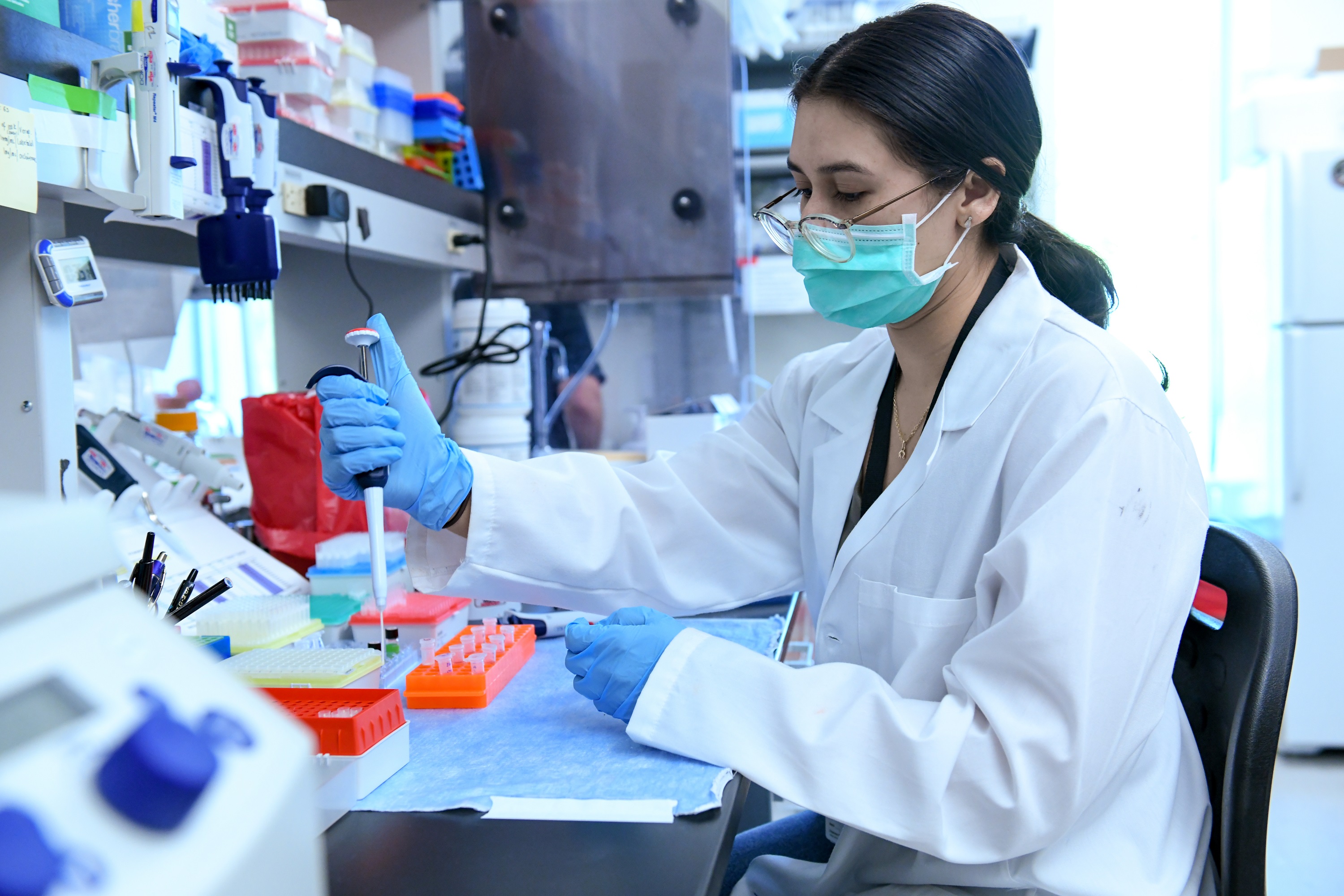How Hackensack Meridian Health Keeps Pace with COVID-19 Twists and Turns

May 25, 2022
Understanding the various COVID-19 variants is critical to treating patients with COVID. It is also a public health issue: Knowing how variants are evolving in the community can better inform health professionals about the potential effectiveness of therapies and vaccines.
That’s why Hackensack Meridian Health Center for Discovery and Innovation (CDI) runs a proactive virus variant surveillance team in partnership with Quest Diagnostics, which performs network-wide testing for the COVID-19 virus.
How COVID Surveillance Works
- Quest Diagnostics performs network-wide testing for the COVID-19 virus.
- Positive nasal swabs are sent to CDI for rapid molecular profiling of virus variants.
- The data is reported internally to our clinical community and also communicated to the New Jersey Department of Health.
- RNA sequencing is performed on about 10 percent of the viruses for quality control and evolution studies.
Over the past two years, the CDI COVID-19 virus response team has analyzed many thousands of viruses and is evaluating new virus-positive swabs collected on a weekly basis.
“The proactive stance allows Hackensack Meridian Health to quickly identify virus variants of concern and take a proactive clinical approach as needed,” says David Perlin, Ph.D., chief scientific officer at CDI.
For example, when an outbreak of a unique variant that was linked to immune escape appeared at one of Hackensack Meridian Health’s psychiatric facilities in New Jersey in 2020, the network quickly identified it and, through proper infection control, was able to squelch it before it could spread into the community.
“Ultimately, it’s easier to put out a small fire before it becomes a raging inferno,” Dr. Perlin says.
This proactive evaluation of infecting and circulating viruses is important to identify whether a variant is resistant to treatments, such as our frontline antibody cocktails.
“This process isn’t just important on the research end, but also on the clinical side,” Dr. Perlin says. “When a new variant is emerging, our hospitals need to know in order to prepare for it and the possible surge of patients that may follow.”
In addition, when the immune-escape Delta variant was first emerging in our region, virus variant analysis was instrumental in a clinical decision to change the first-line antibody cocktail to a more effective therapy. “Rapid clinical decision-making of this type requires a real-time interplay of scientists and clinicians to drive more effective patient management solutions,” Dr. Perlin says.
Identifying Future Variants
Hackensack Meridian Health continues to track COVID-19 variants in our hospitals in real time. “From the very beginning, this virus has evolved, and it continues to evolve on a daily basis,” Dr. Perlin says. “In terms of mutations, we can track the evolution, and what we’re concerned about are mutations that lead to higher transmissibility and higher infections, which then lead to more hospitalizations, morbidity and mortality.”
Most recently, the BA2 Omicron subvariant of COVID appeared at Hackensack Meridian Health on February 25, 2022 in a single sample. By the end of March 2022, this subvariant accounted for about 75 percent of new cases at our hospitals.
The hunt continues
“The rate of change of COVID has been astonishing over the past two years. It’s hard to say if it will continue to evolve month to month once we enter the endemic phase,” Dr. Perlin says. “We don’t know if that has been happening because there is so much of the virus out there, or it just reflects the nature of this particular virus?”
The Hunt for Variants
- CDI first identified the Delta variant in its patient population in May 2021.
- Delta was the dominant variant from June 2021 to November 2021.
- CDI first identified the Omicron variant in December 2021.
- Omicron BA.1 was the dominant variant from December 2021 to March 2022.
- CDI first identified the BA.2 Omicron subvariant in February 2022.
- CDI first identified the BA.2.12.1 subvariant in April 2022.
Next Steps & Resources:
- Learn more about the Center for Discovery and Innovation
The material provided through HealthU is intended to be used as general information only and should not replace the advice of your physician. Always consult your physician for individual care.
The Truth About COVID-19 Vaccines

COVID-19 Vaccine Facts: Dr. Zuckerman debunks myths. Get accurate information & resources. Call 800-822-8905.
What Does Endemic Mean?

Understand endemic vs. pandemic COVID-19. Dr. Zuckerman explains what to expect. Learn key differences and next steps for your health. Call 800-822-8905.

Why It’s A Bad Idea To ‘Just Get COVID’
Avoid intentional COVID-19 infection. Dr. Cicogna explains the risks, including severe illness and long COVID. Learn more and schedule an appointment.

Doctors Serve and Protect Police Officer Recovering from COVID-19
Two years after contracting the novel coronavirus, Frank Salerno is finally catching his breath with the help of pulmonary rehab.

Is it Safe to Travel this Summer?
Safe Summer Travel? Dr. Zuckerman offers tips for healthy trips. Reduce COVID-19 risk with smart planning. Schedule an appointment today: 800-822-8905

Yvette M. on Coping with Grief after the Unimaginable
Yvette M. and her teenage sons, Justin and Steven, weren’t prepared for the grief they felt when their father and her husband, Miguel, lost his life to COVID-19.
